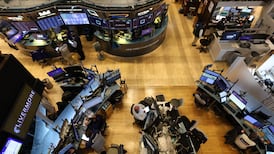European shares chalked up modest gains on Tuesday after taking a battering from banks the previous day, but weak oil prices before a meeting of Opec producers limited gains.
Italian banking stocks staged something of a recovery, but miners came under renewed selling pressure after a sharp decline in commodities prices.
Oil prices fell more than 1.5 per cent on jitters over whether Opec would be able to hammer out a meaningful output cut during a meeting on Wednesday to rein in a global supply overhang and prop up prices.
This meant that an overall recovery in stocks was tempered by commodity-related losses.
“The fact that the FTSE 100 is going one way and the FTSE 250 is going the other way suggests that there is a sector-specific event going on, as the FTSE 100 is more commodities-heavy,” said Investec economist Philip Shaw.
The miner-heavy FTSE 100 index was down 0.38 per cent, but the FTSE Mid 250 was up 0.15 per in early trading.
Outside of the commodities sector, investors appeared inclined to take on more risk, with Italian stocks up 0.72 per cent and the banking sub-index up 2.6 per cent. This helped push the STOXX Europe 600 Index up 0.16 per cent.
MSCI’s broadest index of Asia-Pacific shares outside Japan fell 0.27 per cent after two days of gains. Tokyo stocks slipped 0.3 per cent, hit by a relatively strong yen.
European government bond markets were also trending in this direction, with safe-haven German government bond yields up one to two basis points and lower-rated Italian, Spanish and Portuguese bond yields lower.
Referendum
Italy, in focus ahead of a referendum this weekend, led the gains on the day with its 10-year bond yields down 4.7 basis points to 2.02 per cent.
But the gain comes just days after the bond yields hit their highest level since September 2015.
“I wouldn’t overdo it by describing this as a risk-on environment – the gains [in bond and share prices] are still relatively modest,” he said.
Italian bond yields have been rising before Sunday's referendum on constitutional change, on which prime minister Matteo Renzi has staked his future.
“Citi’s base case is for a No vote to prevail, with political uncertainties likely to remain elevated over the near term,” wrote analysts at Citi.
“It’s worth watching whether PM Renzi resigns in the event of a No vote as promised, before rushing into euro shorts.”
The event has brought Italy’s ailing banking sector into sharp relief, and earlier this week Italian banking stocks hit their lowest point since the end of September on continued worries over a cash call at troubled Monte dei Paschi.
The political risk kept the euro restrained despite the pullback in the dollar. The single currency fell 0.17 per cent to $1.0597.
The dollar was again moving higher on the yen to reach 112.615, after profit-taking pulled it down as far as 111.58. It remains over 7 per cent higher for the month.
Dealers reported Japanese buying for the new month, with orders on Tuesday settling on December 1st. Against a basket of currencies, the dollar held at 101.280 and not far from last week’s 14-year peak.
The greenback was still on track for its strongest two-month gain since early 2015, underpinned by expectations the Federal Reserve is almost certain to hike interest rates next month.
– Reuters















